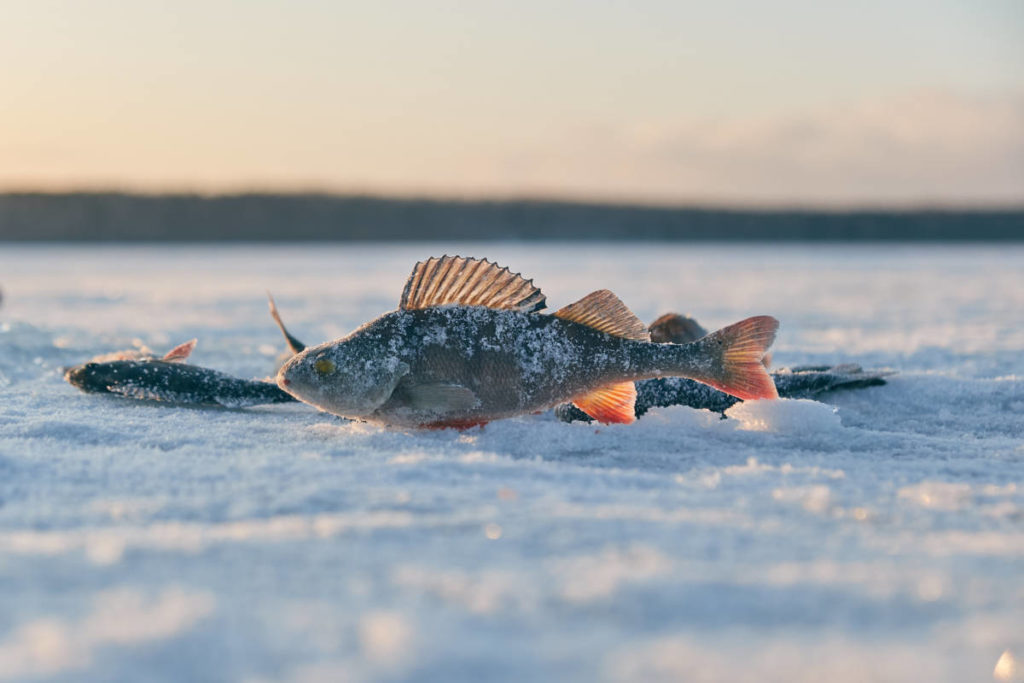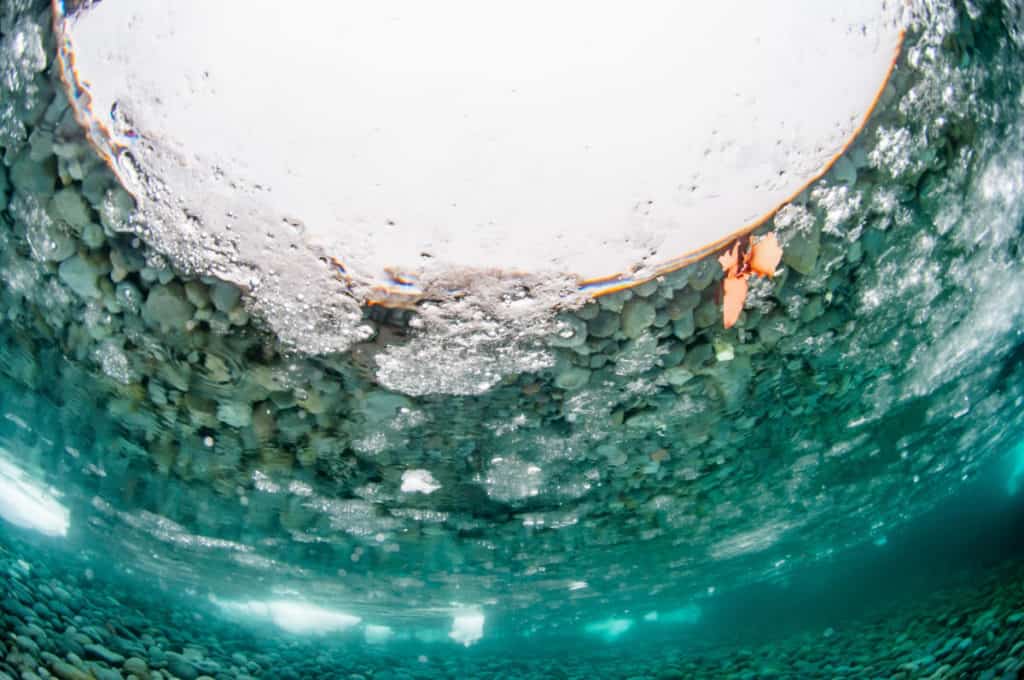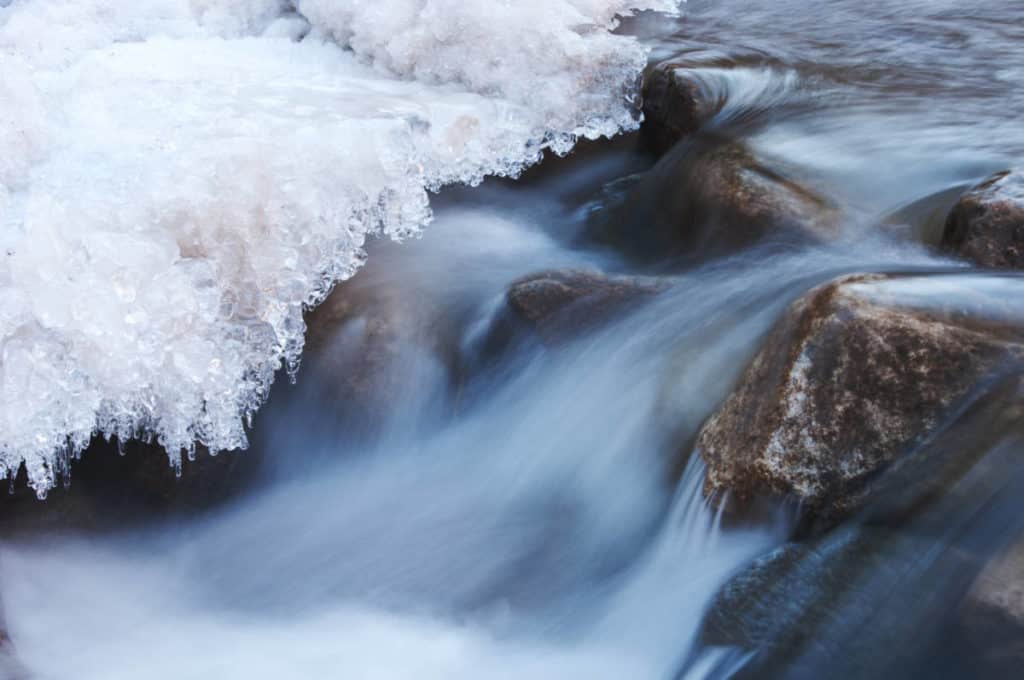The first winter with your new fish pond can be nerve-wracking. As the temperature drops and the pond begins to freeze, you will find yourself wondering if the fish will survive. So what should you do next?
When a fish pond freezes, the ice covering the top of a frozen fish pond provides the fish with warmth and insulation. The fish will spend most of their time at the bottom of the pond. Place an aerator in the pond to increase the dissolved oxygen levels of the water.
You might feel the need to use water heaters to stop the fish pond from freezing; however, there is very little you actually need to do to keep your fish alive when their pond freezes each winter.
How Do Fish Survive in Winter
Although it might be concerning to see your fish pond freeze over, fish in the wild do not have anyone to break open the ice or heat their pond. Chances are, your fish will be fine even if you do not do anything.
But how do fish survive in a frozen pond? Well, they can do it because water is an amazing thing.
While hot air rises, hot water actually sinks. Just because there is a layer of ice on top of the pond, this does not mean the fish are frozen at the bottom of the pond.
Another interesting fact about water is that it is heaviest when it is 39.2 degrees Fahrenheit (4 degrees Celsius). The increased density of the water insulates the fish with warmer water as the colder water rises to the top (because of its lower density).
For an extra layer of protection, some fish will bury themselves in the mud or sand at the bottom of the pond. If your pond has a concrete bottom, consider adding some substrate for the fish to burrow into during the winter months.
Regardless of the temperature in the pond, the chances of the fish freezing to death are low. Fish are cold-blood creatures. In other words, they cannot create their own body heat. This might lead you to think that they need warmth to survive. However, their body temperature matches the temperature of their environment.
Cold water species are fish that can withstand the lower temperatures caused by a winter freeze. In aquariums, these fish do not require a tank heater. Additionally, in the wild, they will not die during harsh winter weather. The optimal temperature for cold water fish is around 60 degrees Fahrenheit.
According to Aquatic Delights, cold water fish often have less color than other species and are often larger in size. Additionally, they live longer than other types of fish species.
Remember, not all fish were designed for winter freezes. Make sure the fish you stock your pond with are a cold water species that can survive the temperature drop.
Be careful to avoid stocking your fish pond with any warm water species. Although some warm water fish species can survive colder winters, the majority of them will perish in a frozen pond. Warm water fish should be raised in an area where the water temperature is frequently around 80 degrees Fahrenheit.
Whether a fish is a cold water or a warm water species is not always cut and dry. For example, there is a third category comprised of the fish who fall between the cold water and warm water living standards. These are known as cool water fish
Cool water fish prefer to live in water that’s around 70 degrees Fahrenheit. They can endure more mild winters and warmer summers.
Not sure what category the fish in your pond are? Check out this helpful table!
| Cold Water Species | Cool Water Species | Warm Water Species |
| Archer fish | Northern Pike | Largemouth bass |
| Sturgeon | Yellow Perch | Catfish |
| Goldfish | Walleye | Sunfish |
| Koi | Muskellunge | Bluegills |
| Rosy Red/Fathead Minnows | Crappies |
Cool water fish are an acceptable choice for outdoor ponds so long as a portion of the pond never freezes over. This will require running a water heater (ice melter) all winter long.
Do not attempt to capture wild fish for your outdoor fish pond. Unless the pond is manmade, this could be considered introducing an invasive species (a crime in many areas). Additionally, caring for wild fish is much different than caring for those raised in captivity.
Wild fish require lots of space to move around and an abundance of oxygen all year long. If you attempt to raise wild fish in your outdoor pond, chances are good that they will not survive the winter.
How to Care for Fish in the Winter

So your fish will stay warm, but will they starve or suffocate in the frozen water?
Let’s first look at how to feed your fish during the winter months. According to AquaNooga, once the temperature drops below 50 degrees Fahrenheit, you should stop feeding the fish. Fish’s metabolism speed drops in colder water, meaning they need less food to survive. Additionally, with a lower metabolism, it is harder for them to digest their food. The fish can survive by eating bacteria, algae, and other microorganisms in the pond.
As for suffocation, this is a serious problem that could kill your fish.
In natural ponds, groundwater introduces oxygen into the water for the fish to breathe. However, man-made ponds usually need aeration assistance. To increase the levels of dissolved oxygen in your fish pond throughout the summer, you might use a water feature or a water aerator. Unfortunately, it is difficult to run a water feature throughout the winter. Additionally, as the ice freezes, it could stop the aerator from working. If a solid layer of ice covers your fish pond, the water could become oxygen-depleted.
Before taking any drastic measures to aerator your fish pond this winter, consider the following information.
As the temperature of your fish pond drops, the colder water begins to retain more dissolved oxygen. In other words, it takes longer for fish to suffocate in colder water. Additionally, the circumstances that lead to fish suffocating are rare.
Fish do not absorb oxygen solely through their gills. Oxygen is absorbed into their system through the blood vessels in their skin, around the swim bladder, stomach, and gut. If oxygen levels in your fish pond drop, they will absorb as much oxygen as possible through these methods.
The main concern when a fish pond freezes is that the water is cut off from oxygen. If there are plants in the ponds, photosynthesis will continue to put oxygen into the water. However, if there are no plants in the water, the fish could drain the excess oxygen from the water. The presence of algae or bacteria in the water will also contribute to the depletion of oxygen in the water.
To prevent fish suffocation, many pond owners run water heaters and aerators through the winter. While this works, it could result in a hefty electric bill.
When your fish pond freezes over, simply break open the ice to filter more oxygen into the water. Pounding on the ice might be traumatic to the fish (although in some cases it is an acceptable option). Instead, use hot water to break the ice.
Heat several pots of water on the stove or in a kettle. Once the water is boiling, pour it over the ice. Keep pouring the hot water onto the same location until you break through. If desired, insert an aerator into the hole. Be sure to remove the aerator before the pond freezes around it. because this could damage the machine beyond repair.
Some pond de-icers or water heaters can be placed on top of the ice and will melt their own way through the ice. This tactic can save you lots of time and trips outdoors carrying buckets of hot water. Read the instructions of your de-icer prior to attempting this method.
A water heater should not be placed near an aerator. As the water gets heated, the aerator sends it away. While you might think this heats the whole pond, this actually just places extra wear on the water heater. If the warm water stays in one place, it will reduce the need to repeatedly break the ice open.
But what should you do if the pond freezes solid?
Unless your pond is less than a foot deep, the chances of it freezing solid are slim. However, if you have a shallow fish pond, consider running a sinking water heater or an aerator to prevent the pond from freezing through.
If running a water heater is not a feasible option, you might consider bringing the fish to an inside tank until the area thaws. Moving your fish inside allows you to maintain their feeding schedule and guarantees that they will not freeze during the winter. Be sure to drain the pond and turn off the filters if you choose this method.
Winter Pond Maintenance

Caring for your fish pond should start before winter sets in. Routine maintenance will help keep your fish happy and healthy all winter long. Additionally, conducting seasonal maintenance will prepare you to make a winter care plan.
Remove Tropical Plants
As mentioned earlier, having aquatic plants in your outdoor fish pond contributes to the oxygen levels of the water. However, like the fish, not all plants can survive the wintery months.
If you have any tropical plants growing in your fish pond, transplant them inside to a warmer tank.
Additionally, remove any plants or debris from the pond. Decaying material will produce carbon dioxide throughout the winter. If too much carbon dioxide is present in the water, the fish will suffocate.
Slow their Feeding
As mentioned earlier, fish do not need to eat as much in the winter. As the temperature drops, their metabolism slows. A slower metabolism makes it more difficult for fish to digest their food.
Once the temperature nears 50 degrees Fahrenheit, decrease the feedings. After the temperature drops below 50 degrees, stop feeding altogether. That’s right, you do not need to feed the fish through the winter. They should be able to survive by eating microorganisms in the pond.
Trim the Trees
Now I know what you are thinking, “How are my trees related to my fish pond?” Well, they are.
As summer turns to fall, the leaves change to be magnificent colors. After the trees are done with their art show, they let go of the leaves, letting them drift down to the ground–or in some cases, into your fish pond.
If leaves find their way into the fish pond, they will sink to the bottom and decay. As already mentioned, decaying material could suffocate the fish. While it is impossible to prevent every leaf from entering the pond, trimming any tree branches hanging over the fish pond will prevent a great deal of them from doing so. You can also skim the surface to catch the excess leaves.
Repair Pumps and Filters
If you have a circulating pump or filter in your fish pond, you want to make sure it is in prime condition to survive the winter conditions.
Check that the pump and filter do not need any repairs. If they do, fix them. Become familiar with the machines. If they stop working this winter, you will need to repair or replace them quickly.
If you do not plan on running the pump all winter, remove it before the end of autumn. Be sure to store it somewhere dry and warm. If the pump is left in the water and the pond freezes, the expanding ice could destroy it.
Caring for a fish pond through the winter really is that easy. So long as you stick to your care plan, your fish are sure to survive the season.
The Transition from Winter to Spring

Winter has passed and your fish are once again ready to enjoy their pond. But first, you must transition the pond from its winter care routine.
If any fish did not make it through the winter, remove them as soon as possible. Once the temperature is above 32 degrees Fahrenheit (and not just for a day or two), remove any water heaters or aerators from the pond. Store them in a clean and dry area until next winter.
After the water reaches appropriate temperatures, replace any tropical fish or plants and begin feedings as normal.

